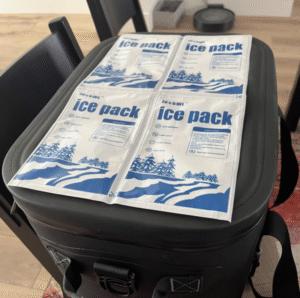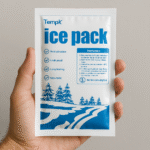How Long Do Dry Ice Packs Last? Essential Insights for Cold Chain Logistics
Understanding the lifespan of dry ice packs is essential for businesses involved in cold chain logistics, medical transportation, and food shipping. This guide explains how long dry ice packs last, what influences their duration, and how you can maximize their cooling efficiency. With the right knowledge, you can optimize your shipments, ensuring temperature-sensitive items arrive safely and in optimal condition.
-
How long do dry ice packs last under different conditions?
-
What factors affect the duration of dry ice’s cooling power?
-
How can businesses extend the life of dry ice during transportation?
-
What are the key differences between dry ice and regular ice?
-
How to store dry ice properly for maximum effectiveness?
What Factors Influence the Duration of Dry Ice Packs?
Dry ice, made from solid carbon dioxide, offers a superior cooling solution for industries that require ultra-cold temperatures. However, its longevity depends on several critical factors:
-
Ambient Temperature: Warm temperatures accelerate sublimation, reducing dry ice lifespan. In cooler environments, dry ice lasts much longer.
-
Insulation Quality: Higher-quality insulation slows down the sublimation process, ensuring dry ice lasts longer.
-
Dry Ice Quantity: Larger amounts of dry ice sublimate more slowly due to their greater mass.
-
Packaging Design: Properly sealed containers help reduce air exposure, slowing sublimation.
How Long Can Dry Ice Packs Last?
The lifespan of dry ice depends on the conditions in which it is used. Here’s a breakdown of dry ice longevity based on key factors:
| Condition | Duration | Practical Implication |
|---|---|---|
| Warm Temperature | 24-36 hours | Less effective for longer shipments |
| Cool Temperature | 48-72 hours | Ideal for short to medium-length shipments |
| Insulated Packaging | 72-96 hours | Best for long-duration shipments or transport |
For example, in a well-insulated container, dry ice can last up to 96 hours under optimal conditions, ensuring the preservation of sensitive goods such as pharmaceuticals.
Best Practices to Extend the Lifespan of Dry Ice Packs
Maximizing the longevity of dry ice requires strategic handling and storage. Consider the following tips to extend its cooling duration:
-
Use Insulated Containers: Always choose high-quality insulated containers to reduce sublimation. Styrofoam coolers or specialized dry ice containers are best.
-
Limit Air Exposure: Reduce air entry to the container. More air means faster sublimation. Ensure containers are sealed but allow gas to escape safely.
-
Store in Cool, Dry Places: Store dry ice in controlled environments where external temperatures are low to slow down sublimation.
-
Use Larger Dry Ice Blocks: Solid dry ice blocks sublimate more slowly than pellets, extending their cooling power.
Practical Example
A pharmaceutical company transporting temperature-sensitive vaccines uses oversized dry ice blocks in insulated containers, reducing shipping costs by 20% and ensuring the proper temperature for the entire journey.
Key Differences Between Dry Ice and Regular Ice
Dry ice offers advantages over regular ice, particularly for long-term, deep cooling. Here’s how they compare:
| Feature | Dry Ice | Regular Ice |
|---|---|---|
| Temperature | -78.5°C (-109.3°F) | 0°C (32°F) |
| State | Sublimates into gas | Melts into water |
| Duration | 18-48 hours | 4-6 hours |
| Residue | No residue | Leaves water behind |
Dry ice is the preferred choice for longer shipments, especially for goods that need to stay frozen, such as pharmaceuticals, biological samples, and certain foods.
How to Store Dry Ice for Maximum Effectiveness
Proper storage is crucial for extending the lifespan of dry ice. To ensure safety and performance:
-
Store in Well-Ventilated Areas: Dry ice releases carbon dioxide gas as it sublimates, so avoid storing it in airtight containers. This ensures a safe and efficient sublimation process.
-
Do Not Store Indoors: Always store dry ice outside or in well-ventilated spaces to prevent the buildup of CO2.
2025 Trends in Dry Ice Technology and Applications
The dry ice industry continues to evolve, with advancements focusing on efficiency, sustainability, and smarter logistics. Key trends to watch include:
-
Eco-Friendly Production: Dry ice production is becoming more energy-efficient, reducing environmental impact.
-
Advanced Insulation: New materials are extending dry ice’s lifespan, benefiting industries like pharmaceuticals and food delivery.
-
Smart Monitoring: Technology that enables real-time tracking of dry ice shipments is becoming more common, allowing companies to adjust conditions dynamically.
Market Insights
The demand for dry ice in industries such as pharmaceuticals, e-commerce, and food delivery continues to grow. As businesses seek reliable and cost-effective ways to transport temperature-sensitive products, dry ice remains a critical tool for ensuring product safety and quality.
Frequently Asked Questions
Q1: How long can dry ice stay effective in a cooler?
Dry ice can last between 18 and 48 hours in a cooler, depending on the insulation, quantity, and temperature conditions.
Q2: Can dry ice last for 72 hours?
While dry ice typically lasts up to 48 hours under ideal conditions, using larger quantities or advanced insulation can extend the cooling duration to 72 hours.
Conclusion and Recommendations
In conclusion, the longevity of dry ice packs varies depending on factors such as the amount of dry ice, insulation, and temperature. Proper storage, handling, and container choice are key to ensuring dry ice lasts as long as possible. For businesses in cold chain logistics, upgrading to advanced insulation materials and using larger blocks of dry ice can help extend cooling duration and improve efficiency.
Next Steps:
-
For businesses: Consider investing in high-tech insulation materials and monitoring systems to optimize the use of dry ice.
-
For consumers shipping frozen goods: Ensure you’re using sufficient dry ice and monitoring the temperature regularly during transport.
About Tempk
At Tempk, we specialize in providing high-quality dry ice solutions designed to ensure the safe and efficient transport of perishable goods. Our products are used across industries such as pharmaceuticals, food, and e-commerce, ensuring that your products arrive in optimal condition.
Need expert advice on optimizing your cold chain logistics? Contact Tempk today for personalized recommendations!
























